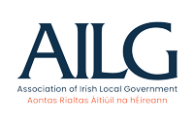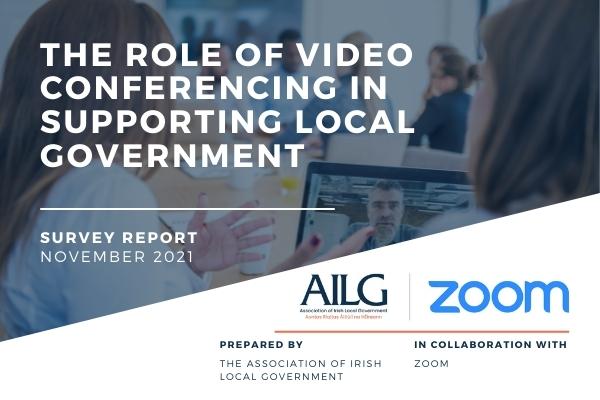Option of remote working within their local authority role is facilitating better family, personal, work and study balance for elected councillors
Local councillors have expressed a clear desire to retain a hybrid model of work which gives the option to conduct local authority business in an online or a physical setting. That’s according to a new report on ‘the role of video conferencing in supporting local government’ launched today (16.11.21) by the Association of Irish Local Government (AILG) in collaboration with Zoom.
Informed by a survey of Ireland’s 949 elected council members, the report outlines how video conferencing supported the continuation of council work throughout the Covid-19 pandemic, the challenges faced in adapting to an online model and the desire to retain a future hybrid model. Key findings include:
- 94% agreed that their council has been proactive in moving meetings online since the start of the pandemic.
- 81% believe a hybrid environment facilitates better family, personal, work or study balance within their role as an elected representative.
- 51% believe that a hybrid environment will encourage more participation in Local Government from underrepresented groups including women, under 35’s, self-employed, full-time carers, and people with a disability.
Commenting as President of AILG, Councillor Nicholas Crossan said: “I sincerely commend our elected councillors and local authority staff on the efforts they took to ensure the continuation of their front-line council work throughout the Covid-19 pandemic. The ability to smoothly transition engagements to an online environment using video conferencing has played a significant role in this. Listening to feedback from councillors on their use of video conferencing over the last 18 months evidently demonstrates several positive learnings we can take from this process, including the desire to retain a hybrid model for conducting future council business.
“We’ve witnessed a significant shift since March 2020, when most councils conducted no meetings or engagements online, to a point now where half of councillors are spending six to ten hours a week on video calls as part of their council business. It’s positive to see councils demonstrate innovative ways of working, proven by the proactive approach to transitioning online. There is now a realisation among most councillors that a hybrid model facilitates better balance between family, personal, work and/or study life and that it opens opportunities to ensure more diversity and gender balance for our local authorities.
Councillors cited the following as key benefits to conducting statutory council meetings and council related meetings with a hybrid option: Improves time efficiency (64%); helps maintain public health measures (37%); provides flexibility to engage with additional council related meetings (35%); better for environment / sustainability (26%); and saves costs (17%).
Zoom Government Relations Director for Ireland, Charlotte Holloway said: “We were delighted to partner with AILG to gain an understanding of the challenges and learnings local authority elected members encountered in transitioning to an online environment. As the ‘go to’ video conferencing provider in Ireland and the most downloaded app in 2020, we were keen to hear where the use of video conferencing for local council engagements could be improved to help make remote working work for councillors into the future. Based on survey feedback, we are confident that a hybrid model of work can maximise efficiency for councils, while also supporting the individual circumstances of councillors beyond their local authority remit.
“We believe there is a significant opportunity for local government to lead from the forefront in terms of demonstrating how the Government’s National Remote Working Strategy can be implemented effectively. In line with the Strategy, councillors should also have the option to engage with local authority business through both digital and traditional channels. This would allow councillors to become trusted and informed champions of remote working among businesses (the employers) and individuals (the employees) whom they represent at a local level.
“Working in partnership with Government and businesses to help achieve the successful implementation of the Remote Working Strategy is a key priority for Zoom in Ireland. In this regard, we are committed to supporting local authorities to ensure they can facilitate the option of a hybrid model for conducting council business that works for all council members and which exemplifies the Strategy in action,” Ms Holloway added.
Most councillors suggested that they are adequately resourced to engage with video conferencing but cited additional training for some councillors would be beneficial, particularly for older members who might need more help. Poor broadband was cited by several councillors as a major challenge to making a hybrid model work efficiently while others suggested better facilities are required within their council buildings.
Councillor Crossan concluded: “While AILG hold the view that physical in-person meetings of the council should always be the default and preferred option, we fully support a hybrid model that creates a council environment which is accessible for all elected members, and which promotes inclusivity and diversity in politics and local government. However, it is a matter for the elected members of each individual local authority, to decide by resolution of the elected council, if they wish to amend their own standing orders to provide for the additional option of a hybrid model for statutory meetings. Local government will continue to play a vital role in providing a forum for the democratic representation of communities as well as promoting the well-being and quality of life of citizens and communities through the efficient performance of functions and delivery of good-value services at local level.
“As the direct link to the electorate, councillors are the backbone to delivering this message. AILG is committed to ensuring that local councillors have the necessary tools and knowledge to fully fulfil their role in community and engagement. It is therefore vital that councillors are equipped with the appropriate technologies to assist them with this work. As a national representative body that represents and supports the role of our elected councillors it is vital that we listen to our members. While there is a clear call for a future hybrid model, it is important that we achieve balance by creating a council environment that supports both digital and traditional communication options for engagement, that work for them.”
The survey of the 949 elected council members ran from Monday, 6th September to Friday, 24th September 2021. A total of 139 complete responses were returned by the closing date representing a 15% response rate. For more information on the work of AILG visit: www.ailg.ie.
ENDS
Media contact:
David O’Donnell, Tel: 01-5880866 / 086-1081139 / E-mail: david.odonnell@instinctif.com.
Notes to editors:
- President of AILG, Councillor Nicholas Crossan and Zoom Government Relations Director for Ireland, Charlotte Holloway are both available for media interview upon request.
- Download ‘The role of video conferencing in supporting local government’ report here.
- Follow AILG on Facebook, Twitter, Instagram and LinkedIn.
About the Association of Irish Local Government (AILG)
The Association of Irish Local Government (AILG) is the primary body representing the democratically elected members and their member local authority. It is a networking, policy development and training resource for the elected members of Ireland’s thirty-one county and city councils.

